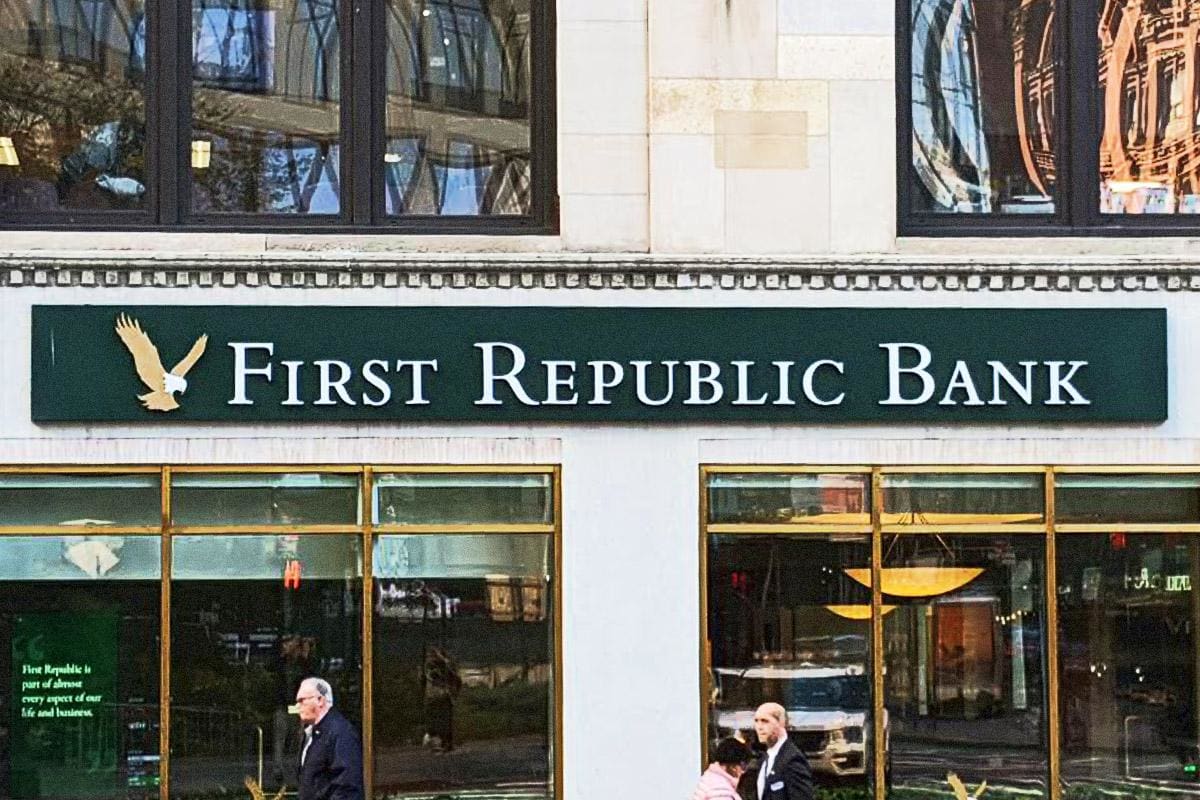
First Republic (FRC) shares extended declines Monday, and traded at an all-time low, following a second credit rating downgrade for troubled San Francisco-based lender over the weekend.
The Wall Street Journal also reported that JPMorgan CEO Jamie Dimon is leading a fresh round of talks with other big U.S. banks in an effort to provide further support, including potentially converting their $30 billion in deposits into a capital injection.
Standard & Poor's, which had lowered First Republic's credit rating into 'junk' status only last week, cut it by a further three notches tp B+ on Sunday, saying the bank continues to face "high liquidity stress with substantial outflows".
The ratings company also said the recent move by a consortium of 11 banks, lead by JPMorgan Chase (JPM) to add a collective $30 billion to its deposit base "may not solve the substantial business, liquidity, funding, and profitability challenges that we believe the bank is now likely facing."
Adding to pressure on the bank's equity value, the New York Times reported late Friday that First Republic continues to explore capital raising options, including potentially the sale of the entire company, following the coordinated deposit injection.
First Republic itself said in a Securities and Exchange Commission filing that its cash position was pegged at only around $34 billion prior to the deposit agreement, which could only last for 120 days, and noted it had borrowed $119 billion over the past week from both the Fed's new lending backstop program and the Federal Home Loan Bank at a rate of 5.09%
Around 70% of its deposits are uninsured, as well, given it deals with wealthy individuals whose savings top the $250,000 limit set by the Federal Deposit Insurance Corp.
Democratic Senator Elizabeth Warren, a vocal critic of U.S. banking regulations, is asking Congress to lift the cap on FDIC insured deposits, potentially to as high as $10 million, in order to truly stem the regional banking sector crisis.
"Small businesses need to be able to count on getting their money to make payroll, to pay the utility bills," Warren told CBS's 'Face The Nation' program Sunday. "Nonprofits need to be able to do that. These are not folks who can investigate the safety and soundness of their individual banks. That's the job the regulators are supposed to do."
First Republic shares, which shed more than $18 billion in value last week, were halted from trading 9 times on Monday and last seen 47.3% lower at $12.11 each. The stock hit an all-time low of $11.52 earlier in the session.
Bank sector shares are likely to face broader pressures, as well, in Monday trading as the weekend deal to place Credit Suisse into the arms of its cross-town rival, UBS Group, failed to soothe investor concerns over the health of the global banking sector and the breadth of the simmering crisis.
Swiss regulators, government officials and the Swiss National Bank orchestrated the late Sunday deal, which will see UBS paying $3.25 billion for Credit Suisse while receiving billions more in liquidity and loss support, just days after declaring the bank solvent following statements from its biggest shareholder in Saudi Arabia.
The SNB said the deal, which includes 100 billion Swiss francs ($104 billion) in liquidity assistance for both firms, will "secure financial stability and protect the Swiss economy in this exceptional situation." Karin Keller-Sutter, Switzerland's Finance Minister, added that a Credit Suisse bankruptcy would have cased "irreparable consequences" for global financial markets.
The speed at which Credit Suisse tumbled, and the decision to wipe out $17 billion in higher-ranking bonds, known as AT1s, while providing billions for equity holders, rattled the European banking sector and otherwise marred the impact of the government-brokered solution.
A late Sunday move by the Federal Reserve to increase the Frequency of so-called dollar swap lines to five major central banks for the first time since the global Covid pandemic also suggested officials fear that pressures in regional U.S. lenders could spillover into the broader banking sector.
U.S. banks, in fact, borrowed a record $152.8 billion from the Fed's discount window over the week ending on March 15, a massive leap from the $4.58 billion taken out during the prior period.
The Stoxx 600 Banks index was marked 1.65% lower in early Frankfurt trading, paring an earlier decline of around 5%, extending its month-to-date slump to around 18%.
Support could come from a weekend deal brokered by the FDIC that will see New York Community Bancorp buy failed lender Signature Bank for a knock-down price after it was closed by regulators just over a week ago.
Flagstar Bank, a subsidiary of New York Community Bancorp, will assume all of Signature Bank's branches and the bulk of its deposit base and pay around $2.7 billion for the bank's $12.9 billion loan book under terms of the deal.
The FDIC, meanwhile, said its Deposit Insurance Fund would take a $3.5 billion hit from the arrangement, around 1.95% of its total value as of the end of December.
"Both the Company and the Bank were well positioned prior to the recent market turmoil, with strong capital, a stable retail deposit franchise, and ample liquidity," said New York Community Bancorp CEO Thomas Cangemi. "Moreover, our asset quality metrics remain solid, as they have over multiple business cycles."
New York Community Bancorp shares were marked 24.6% higher in pre-market trading to indicate an opening bell price of $8.15 each.







